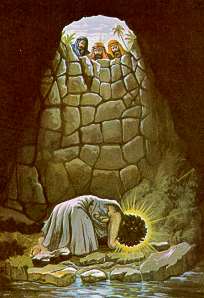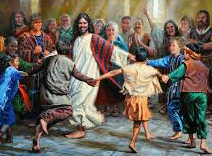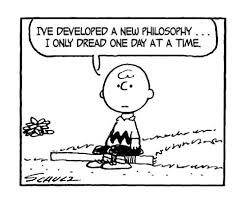Matthew 17:14-21; Mark 9:14-29; Romans 8:26-27
Life can change in a heartbeat. One moment we are dancing on the mountaintop. The next moment we are trudging through the muck in the valley. One moment buoyed in faith. The next set upon by a world cloaked in doubt.
Jesus moved so easily between his mountaintop experiences and those moments that surely sucked the breath from his lungs. We find one such episode following the Transfiguration. Jesus found himself wrapped in the arms of his Father God, strengthened by his Father’s presence. Within moments, he was immersed in a pitched battle of wills that stripped away the deep sense of peace he enjoyed at the top of the mountain.
Halfway down the mountainside
Jesus heard
the first echo of angry shouts.
Glanced at his three trusted friends,
heart beating faster.
Quickening their pace,
they scurried down the slope toward
the sound of madness.
In a heartbeat,
Jesus traded the
tranquility of the transfiguration
for the
frenzy of a fight.
Reaching the bottom of the path,
Jesus pushed through a bewildered crowd
to find his disciples squared off against
an equal number of scribes.
Hurling insults at one another.
Jesus stepped to the center of the melee.
The crowd grew quiet.
Silenced by Jesus’ sudden appearance.
The bitter argument of rivals
Ceased when Jesus stepped into the clearing.
His eyes shifted back and forth between
the scribes and
his disciples.
Jesus turned to Simon the Zealot
standing at the front of the disciples
Fists clenched.
Jaw set in anger.
Tilting his head toward the scribes,
Jesus asked in a wary voice,
“What are you arguing with them about?”
The quarrel erupted anew.
Each side shouting.
Pointing fingers.
Jesus cringed at the hostility.
Before Jesus could silence them,
a man grabbed his arm.
Caught his attention.
Something in his eyes convinced Jesus
to walk with him a short distance
from the heated confrontation.
“I brought you my son today…”
And the words flowed unrestrained.
First a halting trickle of detail.
Then a torrent of despair.
Unburdening his heart to a healer
concerning the nature of the severe illness
that plagued his son for years.
Growing worse with each passing day.
Sapping the boy’s strength.
Threatening his life.
“I asked your disciples to heal him
but they could not.”
The scribes who had followed from a distance,
erupted in laughter.
Seized the opportunity to belittle the disciples
and their master.
The failure of the disciples
opened the door for them to
discredit Jesus for their incompetence.
The disciples.
Seeing the pained look in Jesus’ eyes,
studied the ground at their feet.
Defiance before the scribes turned to
embarrassment and shame.
Jesus ran his left hand through his hair,.
Rubbed his eyes.
Smoothed his beard.
Deep in thought.
The shake of his head almost imperceptible.
A heavy sigh escaped his lips.
The master spoke quietly to his disciples.
“Oh, faithless generation.
How long shall I stay with you?
How long shall I put up with you?”
He turned to the father.
“Bring the boy to me.”
We learn something about Jesus in this passage that instructs us about living in the moment. Jesus just experienced the most moving moment in his earthly life. In the ultimate of mountaintop experiences, Jesus’ work gained affirmation from the father in the presence of Moses and Elijah. For a brief time, Jesus walked in the bright light of God’s presence and praise.
Every one of us can relate for all of us have longed to hear our father’s praise…to hear our father’s words of love. Jesus stood in the middle of a heavenly scene and heard his Father proclaim, “This is my Son, whom I love. Listen to him.”
Can you imagine the overwhelming joy of that personal and poignant moment? More certain than ever of his role in God’s plan to redeem humanity, Jesus committed himself again to the cross. It was the assurance he needed.
Jesus shared that experience with his three closest friends. In the afterglow of the Transfiguration, I can see them standing in a circle with their arms around each other’s shoulders, foreheads almost touching in that prayerful and mind-boggling moment. Expressions of wonder plastered on amazed faces. “Did we see what we just saw? Did we hear what we just heard?”
What a tremendous moment of absolute joy!
Within the hour, though, Jesus found himself in the valley, facing yet another human crisis. He just reaffirmed his commitment to the cross only to find his closest followers baffled and beaten in the task for which he had called them from their tax tables and fishing nets.
In that moment when the disciples could no longer look him in the eye, Jesus must have felt the weight of the world again upon his shoulders. Gone was the aura of glory. In its place, the painful reality of the work that still needed to be done. To go to the cross would be difficult enough. The change human nature might be the more hopeless task. If he could not capture the trust of those closest to him while he was present among them, how could their faith survive the cross?
How often have our mountaintop experiences been followed by that which seemed hopeless? The joy of the mountain rarely survives the walk in the valley. In that moment of crisis, how do we cling to a shaken faith?
Jesus provided an answer. The savior didn’t let his moments of despair overwhelm him. At a time when he surely wondered if mankind would ever find the faith they needed, he did the one thing he knew he could do. He changed the circumstances of a little boy. He changed what he could.
Living as a Christian in an angry, despairing world challenges our faith. Begs us to make a difference. We wonder how we can impact a world that refuses to listen? What can one person do? We lose heart. Lose faith.
Jesus teaches us in this episode that we draw upon the reserves of faith energized on the mountaintop to enable us to deal with the inevitable valley moment. To not let the faithlessness of the world drain our energy or resolve. Jesus shows us that we fight through the episodes that discourage us, finding that thing we can do and doing it, rather than giving in to our despair.
That, my friends, is a lesson I need to learn in this day as I grow so frustrated with the rancid animosity and argument so prevalent in society. When I wonder what I can do to change the world I need only follow Jesus’ example. His example tells me to change what I can. We were not saved by God to stay on the mountain, but to get down in the valley and change what we can.
This passage teaches another great lesson about coming to terms with our struggling faith. God uses even our shrouded faith to accomplish his will. A little is often enough.
Join me back in the story. Jesus asked the father to bring the boy to him. The father obediently carried his boy to Jesus, standing him in front of the great healer. Immediately, the young boy suffered another seizure…violent and terrifying. As the boy fell to the ground trembling, I can imagine Jesus dropping to his knees, placing his hand on the boy’s chest, trying to quiet the tremors.
With his eyes never leaving the boy, Jesus asked the father, “How long has he been like this?” The question was not a medical inquiry. Rather, hear the heartfelt compassion Jesus felt for the misery suffered by an innocent child. The father shared more of the boy’s story and finally asked the favor he wanted to ask of Jesus when he approached the disciples earlier that day. “If you can do anything, take pity on him and help us.”
Jesus looked up at the father, “If you can?…” Hoping to see a glint of faith reflected in the man’s eyes. “Everything is possible for him who believes.”
With tears in his eyes, the father responded, “I do believe, but help me with my unbelief.”
What a true confession of this father’s heart. What a true confession of my own soul. He came seeking Jesus. When Jesus was absent, he thought he found the next best thing…Jesus’ disciples. Whatever faith he brought to the mountain was thrown to the wind by the disciples’ inability to help. The result left him so discouraged that all he could muster when Jesus asked his question was a whispered plea, “If you can…”
Face to face with Jesus, his fragile faith bubbled to the surface. Oh, how his words echo how I feel at times. “I do believe, Jesus. I believe, but I am so discouraged. Doubt is my constant companion. Please, Lord, take away the uncertainty and replace it with unquestioned belief.”
God moves when imperfect faith cries out to a perfect savior. Belief, though flooded with doubt, calls out to the only one who can fix that which is broken. “If you can….” The Father’s prayer is often my prayer. The father’s doubt is my doubt. The father’s reservation is my reservation. I live all too often in this shallow faith, hoping it is enough.
That’s always what I thought this verse taught as if God were saying “If only your faith were stronger, I could act upon your request.” I suspect there is a measure of truth in that interpretation. However, I look at the verse and wonder if Jesus did not hear the father’s profession of doubt-filled faith as sufficient. Might Jesus be telling him, “Listen, everything is possible for him who believes. Give me whatever faith you have, no matter how limited, because my belief in the father is big enough for both of us.”
Follow me again to the story.
Evening comes.
Jesus and his disciples
lay upon the roof of a house,
staring at the stars glittering the night sky.
Tired after a long day.
But sleep will not come.
In the silence surrounding them,
The disciples think about what happened.
Weeks prior they walked two by two
preaching, teaching and healing
in the power of God.
This morning,
when the father lay is son at their feet…
Dismal failure.
Humiliation.
Embarrassment.
From the mountaintop to the valley.
A raspy voice breaks the silence.
Maybe Simon the Zealot.
Mustering all his nerve,
asks the question all wanted to ask.
“Jesus,
Why could we not heal the boy?”
In this teachable moment, Jesus spoke quietly.
“This kind of thing requires prayer.
This kind of thing requires faith.”
Thinking back on the father with feeble,
but sincere faith,
Jesus added,
“Faith as small as a mustard seed
can move a mountain.”
Hyperbole? Maybe. But maybe this story hits upon the central truth of the matter. Jesus doesn’t ask us for perfect faith because we are imperfect. He asks for whatever faith we have to be placed in his hands…If for no other reason that he has enough faith in the grace, goodness and the power of God for all of us as he lifts our needs to the Father in heaven.
Paul shared this with the church in Rome.
“In the same way, the Spirit helps us in our weakness. We do not know what we ought to pray for, but the Spirit himself intercedes for us with groans that words cannot express. He who searches our hearts knows the mind of the Spirit, because the Spirit intercedes for the saints in accordance with God’s will.”
Place at his feet whatever faith we have and he will take it to the throne of God with the perfect faith of the Spirit.
So, I like this story because we can identify at times with Jesus who came off this amazing mountaintop experience only to find disorder and disarray. Next time we come off a spiritual high, we can look amid the inevitable chaos, as Jesus did, for what we can do and we can do it.
Then, if we find our faith blanketed by the mist of doubt, like the father in the story, let’s give Jesus all the faith we hold no matter how small. Declaring before God, “Help us in our unbelief.” And knowing more that his trust in the Father is enough for all of us.
Plant your mustard seed. Move a mountain.









